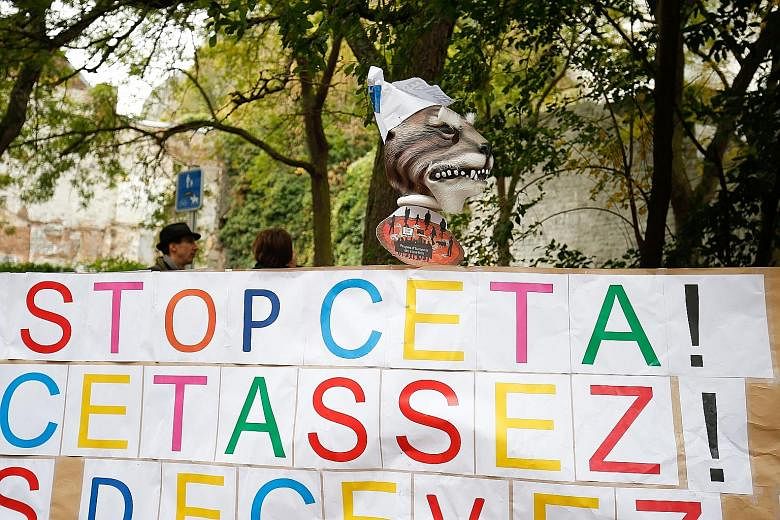BRUSSELS/OTTAWA • The head of the European Parliament and Canada's trade minister held last-ditch talks yesterday aimed at salvaging a trade deal threatened by a Belgian region's refusal to sign on.
The issue is greater than just a trade deal with Canada, the EU's 12th-largest trading partner.
If the Comprehensive Economic and Trade Agreement (Ceta) fails, the EU's hopes of completing similar deals with the United States or Japan would be in tatters, undermining a bloc already battered by Britain's vote to leave it and disputes over Europe's migration crisis.
But British Prime Minister Theresa May has dismissed warnings that the Ceta logjam raised serious questions about whether London could strike a similar agreement after Brexit.
European Council president Donald Tusk said Europe's credibility was at stake.
Canadian Prime Minister Justin Trudeau has also said failure to ratify the pact would raise questions about the EU's viability.
Estonian Prime Minister Taavi Roivas said on Friday: "If Europe fails with Ceta, it's very difficult to imagine we can be successful with TTIP."
He was referring to parallel negotiations with the US on a separate deal known as the Transatlantic Trade and Investment Partnership.
Canadian Trade Minister Chrystia Freeland walked out of talks in Belgium on Friday, declaring that the EU was incapable of sealing the deal after negotiations broke down amid opposition from the Belgian region of Wallonia.
All 28 EU governments support Ceta, but Belgium cannot give assent without backing from its five sub-federal administrations, and French-speaking Wallonia has steadfastly opposed it.
Nevertheless, European Parliament President Martin Schulz said he was optimistic he could salvage the trade deal after meeting Ms Freeland in Brussels yesterday.
He had also scheduled separate talks with Wallonia's Minister-President, Mr Paul Magnette.
"The Canadian side is prepared to sign," Mr Schulz told reporters after the meeting with Ms Freeland. "I'm very optimistic that we can solve the problems that we have within the European Union."
He had said earlier on Twitter: "We can't stop at the last mile."
The agreement, the EU's first with a Group of Seven country, would, according to supporters, increase trade between the partners by 20 per cent.
An emotional Ms Freeland had earlier said, after quitting talks with chief Canadian and EU trade negotiators and Mr Magnette: "It is now evident to me, evident to Canada, that the European Union is incapable of reaching an agreement - even with a country with European values such as Canada."
She added: "Canada is disappointed and I, personally, am disappointed, but I think it's impossible."
Wallonia continued to have concerns about the threat of surging pork and beef imports from Canada and an independent court system to settle disputes between states and foreign investors, which critics say may be used by multinationals to dictate public policy.
Ceta was, in theory, due to be signed at a summit on Thursday in the presence of Mr Trudeau.
REUTERS, BLOOMBERG, AGENCE FRANCE-PRESSE

